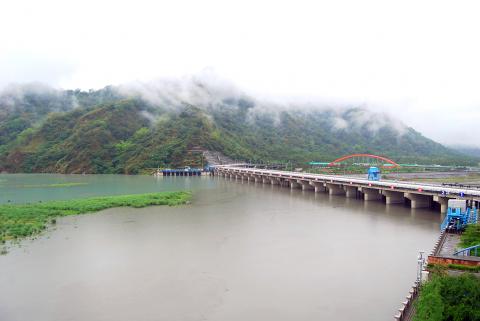The threat of water shortages in the country is “thousands of times more serious” than that of radiation leaks or toxic waste from petrochemical plants, Public Construction Commission (PCC) Chairman Lee Hong-yuan (李鴻源) said yesterday.
Water resource management in Taiwan is poor because the government focuses on building more reservoirs as a short-term option instead of addressing a sustainable and balanced development plan for renewable resources, Lee told a seminar on water control held by the Yu Chi-Chung Cultural and Educational Foundation.
The foundation said more than 75 percent of Taiwan’s annual collected rainfall of 90 billion tonnes evaporates in storage or is lost in the supply process.

Photo: Chen Hsin-jen, Taipei Times
Lee said the water shortage problems can largely be attributed to increasing reservoir sedimentation, poorly maintained pipelines and careless usage by consumers, who have long enjoyed very low water costs.
A 2004 survey by the Taiwan Water Corp found the average water rate in Taiwan was NT$10.72 per cubic meter, compared with NT$65 in Japan and NT$19.3 in the US.
Lee said there needed to be more coordination among the Water Resources Agency, the Council of Agriculture and the Construction and Planning Agency to allocate water management budgets more efficiently as well as set a reasonable price for water.
Lack of rain earlier this year has led to water restrictions in several areas. A plan to impose a second stage of water rationing in select areas at the end of this month was postponed on Monday in the wake of heavy rains in the past week.
The Ministry of Economic Affairs said it would wait to see how much more rain falls this week before deciding whether to impose further water rationing next month. Southern Taiwan, which has collected 17 million cubic meters of water since last Friday, will still faces shortages during the peak June-to-November rice planting season if it does not receive more rain, the ministry said.
Noting the recent protests by environmentalists against Taiwan’s nuclear power and petrochemical industries, Lee said similar action needs to be taken to push the government to tackle the water issue.
“We can’t expect the rain to fall every time we find ourselves short of water, “ Lee said. “We need a policy that has vision.”

ANOTHER EMERGES: The CWA yesterday said this year’s fourth storm of the typhoon season had formed in the South China Sea, but was not expected to affect Taiwan Tropical Storm Gaemi has intensified slightly as it heads toward Taiwan, where it is expected to affect the country in the coming days, the Central Weather Administration (CWA) said yesterday. As of 8am yesterday, the 120km-radius storm was 800km southeast of Oluanpi (鵝鑾鼻), Taiwan’s southernmost tip, moving at 9kph northwest, the agency said. A sea warning for Gaemi could be issued tonight at the earliest, it said, adding that the storm is projected to be closest to Taiwan on Wednesday or Thursday. Gaemi’s potential effect on Taiwan remains unclear, as that would depend on its direction, radius and intensity, forecasters said. Former Weather Forecast

As COVID-19 cases in Japan have been increasing for 10 consecutive weeks, people should get vaccinated before visiting the nation, the Centers for Disease Control (CDC) said. The centers reported 773 hospitalizations and 124 deaths related to COVID-19 in Taiwan last week. CDC Epidemic Intelligence Center Director Guo Hung-wei (郭宏偉) on Tuesday said the number of weekly COVID-19 cases reported in Japan has been increasing since mid-May and surpassed 55,000 cases from July 8 to July 14. The average number of COVID-19 patients at Japan’s healthcare facilities that week was also 1.39 times that of the week before and KP.3 is the dominant

The Chinese Communist Party’s (CCP) working group for Taiwan-related policies is likely to be upgraded to a committee-level body, a report commissioned by the Mainland Affairs Council (MAC) said. As Chinese President Xi Jinping (習近平) is increasingly likely to upgrade the CCP’s Central Leading Group for Taiwan Affairs, Taiwanese authorities should prepare by researching Xi and the CCP, the report said. At the third plenary session of the 20th Central Committee of the CCP, which ended on Thursday last week, the party set a target of 2029 for the completion of some tasks, meaning that Xi is likely preparing to

US-CHINA TRADE DISPUTE: Despite Beijing’s offer of preferential treatment, the lure of China has dimmed as Taiwanese and international investors move out Japan and the US have become the favored destinations for Taiwanese graduates as China’s attraction has waned over the years, the Ministry of Labor said. According to the ministry’s latest income and employment advisory published this month, 3,215 Taiwanese university graduates from the class of 2020 went to Japan, surpassing for the first time the 2,881 graduates who went to China. A total of 2,300 graduates from the class of 2021 went to the US, compared with the 2,262 who went to China, the document showed. The trend continued for the class of 2023, of whom 1,460 went to Japan, 1,334 went to